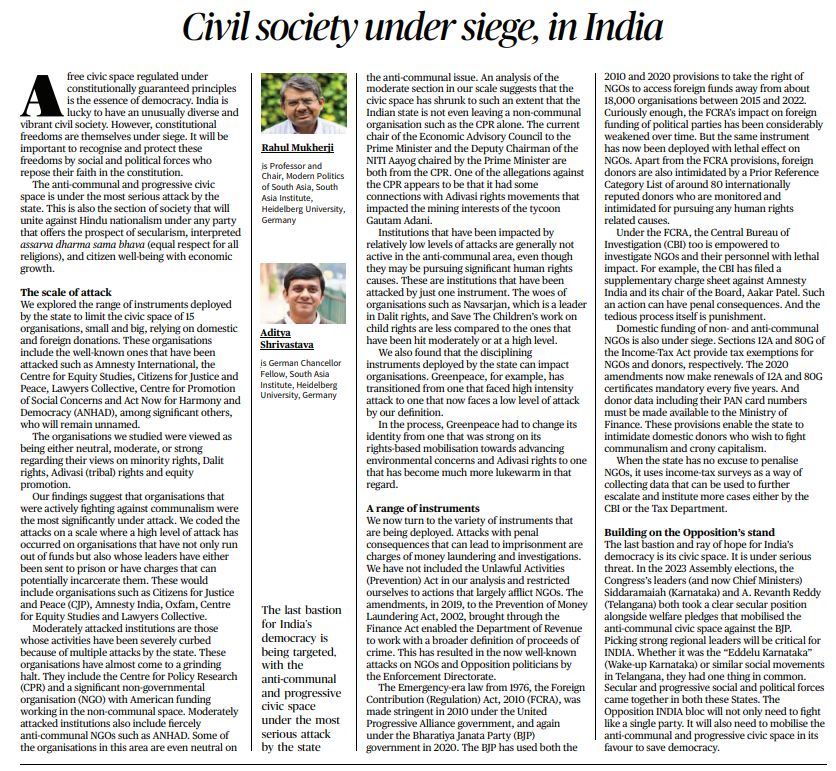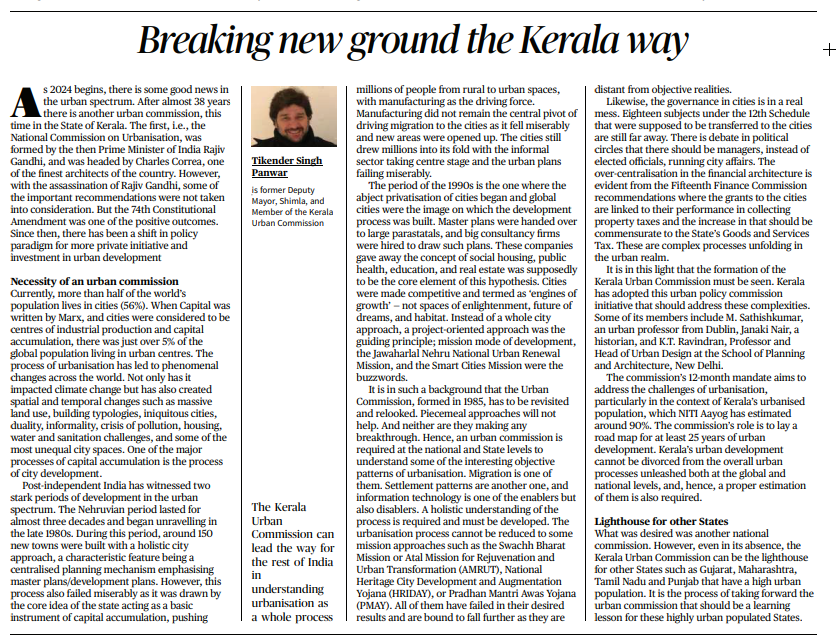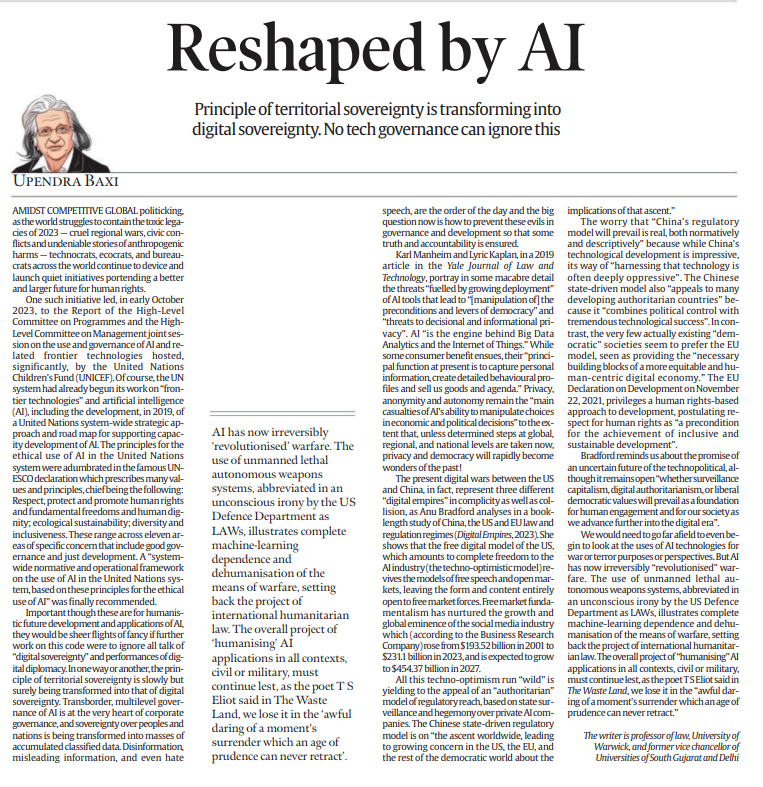The Threat to Civic Space in India
Introduction
- The editorial emphasizes that a free civic space regulated by constitutionally guaranteed principles is crucial for democracy.
- Despite India’s diverse and vibrant civil society, constitutional freedoms are currently under siege.
- Protecting these freedoms is vital, requiring recognition and support from social and political forces that trust in the constitution.
Targeting the Anti-Communal and Progressive Civic Space
- The most serious attack on civic space is directed towards anti-communal and progressive sections of society.
- These groups unite against Hindu nationalism and advocate for secularism and citizen well-being with economic growth.
- The scale of attack varies, with some organizations facing severe consequences such as leaders being sent to prison.
Scale of Attack on Organizations
- The study explores the range of instruments employed by the state to limit the civic space of 15 organizations, varying in size and relying on domestic and foreign donations.
- The level of attack is categorized as high, moderate, or low, depending on the severity of consequences faced by the organizations.
Instruments Deployed by the State
- Several instruments are identified as tools to limit civic space, including charges of money laundering, investigations, and amendments to laws like the Prevention of Money Laundering Act and the Foreign Contribution (Regulation) Act.
- The latter, especially the 2020 amendments, has significantly impacted the access of NGOs to foreign funds.
- The state also employs tax-related amendments, income-tax surveys, and other tactics to intimidate and penalize domestic donors supporting non-communal causes.
Building on Opposition’s Stand
- The editorial concludes by highlighting the critical role of civic space in India’s democracy.
- It discusses the 2023 Assembly elections, where leaders like Siddaramaiah and A. Revanth Reddy took a clear secular position, mobilizing anti-communal civic space against the BJP.
The importance of strong regional leaders in preserving India’s democracy is emphasized, requiring the Opposition to unite and mobilize progressive civic space in its favor.
Revisiting Urban Development: The Significance of the Kerala Urban Commission in 2024
Introduction:
As the year 2024 commences, the urban landscape in India sees a positive development—the establishment of a new urban commission in the state of Kerala, after a hiatus of 38 years since the National Commission on Urbanisation.
This editorial discusses the historical context, the necessity of an urban commission, and the unique challenges faced by urbanization in India.
Historical Background:
- The National Commission on Urbanisation, formed in 1985 under Prime Minister Rajiv Gandhi, marked a significant era in urban planning.
- However, its recommendations faced setbacks following Rajiv Gandhi’s assassination.
- Despite this, the 74th Constitutional Amendment emerged as a positive outcome, leading to a shift in policy towards greater private initiative and investment in urban development.
Necessity of an Urban Commission:
- With over 56% of the global population residing in cities, urbanization has brought about substantial changes worldwide.
- The article highlights the impact of urbanization on climate change, spatial and temporal transformations, and challenges such as pollution, housing, water, and sanitation.
- It emphasizes the role of city development as a key process of capital accumulation.
Evolution of Urban Development in India:
- The post-independent urban development in India witnessed two distinct periods—the Nehruvian era, characterized by centralized planning and industrialization, and the 1990s, marked by privatization and the emergence of global cities.
- The latter saw a shift towards project-oriented approaches, with missions like the Jawaharlal Nehru National Urban Renewal Mission and the Smart Cities Mission.
Challenges in Urban Governance:
The article sheds light on the current challenges in urban governance, including the delay in transferring subjects to cities as per the 12th Schedule, debates on the role of elected officials versus managers, and financial centralization as evident in the Fifteenth Finance Commission recommendations.
The Emergence of the Kerala Urban Commission:
- The formation of the Kerala Urban Commission in 2024 is seen as a strategic move to address the complexities of urbanization.
- Comprising members with diverse expertise, the commission has a 12-month mandate to create a roadmap for 25 years of urban development, considering Kerala’s urbanized population estimated at around 90% by NITI Aayog.
Potential Influence on Other States:
- While a national commission was initially desired, the Kerala Urban Commission is positioned to serve as a beacon for other states, including Gujarat, Maharashtra, Tamil Nadu, and Punjab, which face significant urbanization challenges.
- The article suggests that the process adopted by the Kerala Urban Commission could offer valuable lessons for these highly urban-populated states.
Conclusion:
As urbanization continues to shape the global landscape, the establishment of the Kerala Urban Commission signifies a crucial step towards addressing the complex challenges of urban development. Its success may set a precedent for other states grappling with similar issues, offering insights into holistic approaches that extend beyond mission-specific initiatives.
The Global Landscape of AI Governance and its Implications on Human Rights
Introduction:
Amidst a backdrop of global conflicts and anthropogenic challenges, various committees and organizations are working towards shaping the future of human rights through the use and governance of artificial intelligence (AI) and frontier technologies.
UN Initiatives and Ethical Framework:
- In October 2023, the United Nations Children’s Fund (UNICEF) hosted a joint session of the High-Level Committee on Programmes and the High-Level Committee on Management, focusing on the ethical use of AI.
- The principles outlined in the UNESCO declaration emphasize values such as human rights, ecological sustainability, diversity, and inclusiveness.
- The recommendation for a system-wide normative and operational framework based on these principles reflects a commitment to humanistic development.
Digital Sovereignty and Diplomacy:
- The discussion on AI governance cannot disregard the concept of “digital sovereignty.”
- Territorial sovereignty is gradually transforming into digital sovereignty, posing challenges for governance and development.
- The accumulation of classified data, disinformation, and hate speech in the digital realm raises questions about maintaining truth and accountability.
Threats and Challenges:
- The deployment of AI tools, as highlighted by Karl Manheim and Lyric Kaplan, poses threats to democracy and privacy.
- The manipulation of decisional and informational privacy through AI’s role in Big Data Analytics and the Internet of Things is a growing concern.
- The ongoing digital conflicts between the US and China exemplify the clash of different regulatory models, with implications for privacy, autonomy, and democracy.
Regulatory Models:
- The contrast between the free digital model of the US and China’s state-driven regulatory model signifies a broader global debate.
- While the US embraces techno-optimism, China’s approach is characterized by state surveillance and hegemony over private AI companies.
- The worry that China’s model might prevail globally raises concerns about its oppressive nature, especially in authoritarian countries.
EU Model and Human-Centric Digital Economy:
- In contrast to the US and China, the EU model is viewed as providing the necessary building blocks for a more equitable and human-centric digital economy.
- The EU Declaration on Development emphasizes a human rights-based approach to development, reflecting a commitment to inclusivity and sustainability.
Uncertain Future:
- Anu Bradford’s analysis raises questions about the future of the technopolitical landscape, pondering whether surveillance capitalism, digital authoritarianism, or liberal democratic values will shape human engagement in the advancing digital era.
- The uncertainty underscores the need for ongoing efforts to guide the development and application of AI technologies.
AI in Warfare:
- Beyond governance, AI’s impact on warfare is irreversible.
- The use of unmanned lethal autonomous weapons systems signifies a complete dependence on machine learning, challenging international humanitarian law.
- Balancing the “humanization” of AI applications, both civil and military, becomes crucial to prevent irreversible consequences
Conclusion:
As the world grapples with the dual potentials and perils of AI, the need for a comprehensive and ethical framework for governance becomes evident.
Striking a balance between technological advancement and safeguarding human rights is crucial for shaping a responsible and sustainable future in the age of artificial intelligence.




